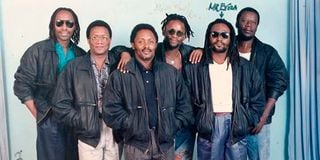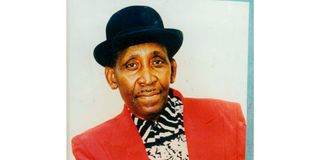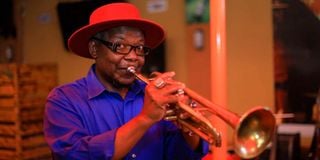Premium
Language of love: Popular songs in Swahili through the decades

Them Mushrooms band members.
July 7 is World Kiswahili Language Day, a celebration of the first African language to be designated among the United Nations Language Days.
Music has been a powerful tool for promoting Kiswahili through the lyrics of songs that have become popular the world over.
The Kiswahili language has transcended borders through genres like taarab, the traditional music of the East African coast to the dance rhythms of chakacha and the contemporary sounds of Tanzanian Bongo Flavour.
Check out the ‘Nation’ list of the most influential songs in the Kiswahili language through the decades.
‘Malaika’, Fadhili William,
Equator Records, 1963
The story of a young man who wants to marry the girl of his dreams but cannot pay the bride price is arguably the best-known Kiswahili song of all time.
Though the song is credited to Fadhili William, he admitted that it was a ‘combined effort’ between himself and Grant Charo, a fellow musician at East African Records, who died after the first recording of the song in 1960.

The late Kenyan musician Fadhili William.
The popular version was recorded at Equator Sound Studio in 1963 by producer Charles Worrod and the enduring appeal of the song has resulted in cover versions by international stars: Miriam Makeba, who called it a love song from Tanzania, Angelique Kidjo, Boney M and Peter Seeger.
‘Sina Makosa’,
Les Wanyika
The masterpiece with interweaving guitars, powerful horns, and brilliant vocals, written by ‘Prof’ Omar Shaban, is one of East Africa’s all-time greatest hits.
After a lull of several years, the great band led by surviving original members, trumpeter Sijali Zuwa and Tommy Malanga, has revived their timeless brand of Swahili rhumba that made them the region’s most influential band in 1970s and 80s.

Les Wanyika band leader Sijali Zuwa plays the trumpet during a media briefing.
Incidentally, they will be performing at a special concert tonight to commemorate World Kiswahili Language Day at the Alliance Francaise, Nairobi.
‘Jambo Bwana’,
Them Mushrooms
The group that celebrated its 50th anniversary in 2022 put Kenya on the world map in the early 1980s with this simple song with catchy lyrics and an infectious rhythm that has become an unofficial national anthem and introduced many non-Kiswahili speakers to the language.

Them Mushrooms band members (from left) John Katana, Hamisi Madonga, Hassan Mandingo and Billy Sarro during a show at the Alliance Francaise auditorium on July 14, 2020.
‘Jambo Bwana’ earned the group Silver, Gold and Platinum discs for sales from 1980 -83 and received international attention when Boney M recorded their version in 1984. There have since been many versions of the songs recorded around the world, raising its cultural impact significantly.
‘Kifo’,
Remmy Ongala
The emotional song by the guitarist, singer, songwriter and bandleader who gave the world ubongo music (brain music). He laments that death has taken away his father and the family has been left suffering with no roof over their head.

The late musician Remmy Ongala.
The song was inspired by the real-life experiences of Ongala (Ramadhani Mtoro) who was born in the DRC and lost both his parents at age of nine. In 1978, ‘Doctor’ Ongala, aka Sura Mbaya, said the lyrics were the most important part of all his songs: “All my songs result from the difficulties that I had in the past – I speak out for my fellow brothers.” He died in 2010 at age 63.
‘Neema’,
DDC Milimani Park Orchestra
The lyrics are about a tiff between two lovers when the former husband and father of the woman’s children returns to her life. Neema (My comforter) featuring the amazing vocals of Cosmas Thomas Chidumule was voted ‘Song of the Year’ by listeners of Radio Tanzania Dar es Salaam (RTD) in 1985 and 1986.
The most popular band of the densi era of big bands in Tanzania, managed under the Dar es Salaam Development Corporation (DDC) part of the Dar City Council, in their heyday had up to 26 members and popularised the mtindo (style) of sikinde horn arrangements and the interplay of guitars.
‘Kasha Langu’,
Mombasa Roots (1985)
Taarab, the signature sound of Swahili culture, with its mix of Arabic, Indian and Swahili cultures, is basically sung poetry and there is no taarab tune more popular than ‘Kasha Langu’. Kasha is the Swahili word for a strongbox or a chest that were popular along the East African coast until the 1970s.
A locked chest is a metaphor for protecting a loved one from adulterers, typical of taarab lyrics applying mafumbo (riddles) and double meanings.
The song became popular in Mombasa in the 1950s, and was originally associated with Athumani Abdullah Kajungu.
It has been recorded by various artists notably Mombasa Roots in 1985 and virtually every taarab ensemble from Mombasa to Zanzibar performs the show at their concerts.
‘Wale Watu’,
Khadja Nin
Khadja Nin, the daughter of a Burundian diplomat who migrated to Belgium in 1980, is an international singer whose enchanting songs in Kiswahili have earned her plaudits for three decades.
Her breakthrough came with the release of the album Sambolera in 1996 a superb collection of songs in Kiswahili, Kirundi and French including the charming ‘Wale Watu’, an outstanding piece with its soft melody and Nin’s warm voice.
‘Salome’,
Diamond Platnumz featuring Rayvanny
The poster boy of Bongo Flavor, the urban music genre of Tanzania, and among the most influential African musicians of his generation, Diamond has enjoyed a string of massive hits in the last decade, raising the profile of Kiswahili through his lyrics, as he expands his brand around the world.
For ths song he dug into the archives and breathed life into a song that was originally a hit for Saida Karoli that he said influenced him in the early 2000s when it caused a sensation across East Africa.





